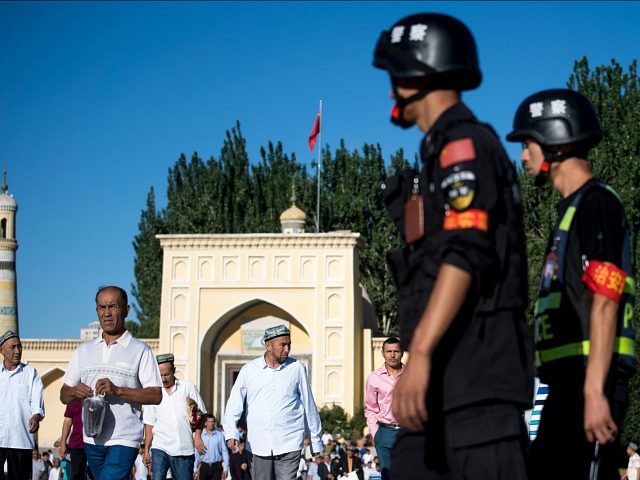Communist state authorities in the Muslim-majority Xinjiang Uighur autonomous region, the largest province in China, have sentenced a distinguished theological scholar to ten years in prison for “illegal religious activity,” reports Radio Free Asia (RFA), citing local sources.
The news outlet notes that Hebibulla Tohti’s verdict came in May after he voluntarily left Cairo, Egypt for Xinjiang to “register” himself with the government as required by Beijing.
Tohti is a member of China’s Uighur (or Uyghur) minority group, a predominantly Muslim group that is often described by human rights groups as oppressed by Beijing, and enjoyed sponsorship from China’s official Islamic Association.
“Observers say that Tohti was likely targeted by authorities as being ‘double-faced,’ according to Xinjiang Party Secretary Chen Quanguo’s recent campaign to punish influential Uyghurs who appear loyal to China’s ruling Communist Party, but secretly promote the interests of their ethnic group,” notes RFA.
“China regularly conducts ‘strike hard’ campaigns in Xinjiang, including police raids on Uyghur households, restrictions on Islamic practices, and curbs on the culture and language of the Uyghur people, including videos and other material,” it adds.
Although Xinjiang is considered autonomous, it is governed by the Communist Party of China, namely the province’s chairman, a communist politician of Uighur descent. Xinjiang is home to China’s largest concentration of Uighurs.
Speaking on condition of anonymity, a faculty member at Xinjiang Islamic University told RFA that the Chinese communist state had sent the scholar to prison for “illegal religious activity.”
“I know that he was detained … by state security police,” noted the source.
The faculty member indicated that “there has been no official announcement of his conviction or what charges he had faced.”
Chinese police have forced thousands of Uighurs to return to Xinjiang by detaining many of their relatives and threatening them with “severe punishment” if they do not return, reveals RFA.
Once in China, many are “detained, forced to undergo political reeducation, and jailed by authorities in Xinjiang, where Uyghurs regularly complain of pervasive ethnic discrimination, religious repression, and cultural suppression under Chinese rule in the region,” it adds.
Tohti was arrested at least twice before he was ultimately sentenced to a decade behind bars.
The source said that immediately after relocating to Xinjiang from Egypt in July 2016, state authorities arrested the scholar for allegedly committing three “illegal activities” while studying at at at Cairo’s prestigious Al-Azhar Islamic University:
Teaching religion to Uyghur students in Egypt without permission from the Chinese authorities, attending a major religious conference in Saudi Arabia in 2015 without permission from the Chinese authorities, and emphasizing the distinct achievements of the Uyghur culture in his dissertation paper, [and failing] to write or speak out positively about Chinese policies in the Uyghur region.
He was detained from July 2016 until January of this year.
Then in March, state security police arrested him after was offered a job teaching at Xinjiang Islamic University.
“He couldn’t pass a security check, so the relevant police department warned our administration not to hire him,” the anonymous faculty member told RFA.
China has blamed the Uighurs for a string of terrorist attacks in recent years. Some Uighur extremists associate with Islamic terrorist groups such as al-Qaeda and the Islamic State (ISIS/ISIL).
Beijing has acknowledged that jihadist groups, particularly the al-Qaeda affiliate known as the Turkistan Islamic Party (TIP), pose a “grave threat” to “security and stability of China and the region.”

COMMENTS
Please let us know if you're having issues with commenting.